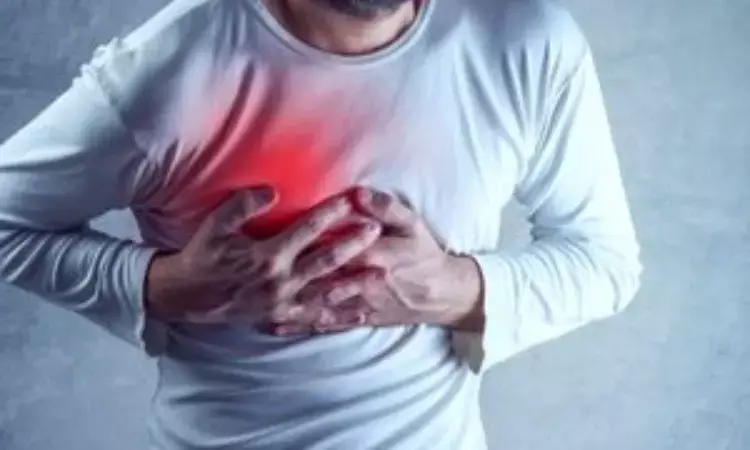- Home
- Medical news & Guidelines
- Anesthesiology
- Cardiology and CTVS
- Critical Care
- Dentistry
- Dermatology
- Diabetes and Endocrinology
- ENT
- Gastroenterology
- Medicine
- Nephrology
- Neurology
- Obstretics-Gynaecology
- Oncology
- Ophthalmology
- Orthopaedics
- Pediatrics-Neonatology
- Psychiatry
- Pulmonology
- Radiology
- Surgery
- Urology
- Laboratory Medicine
- Diet
- Nursing
- Paramedical
- Physiotherapy
- Health news
- Fact Check
- Bone Health Fact Check
- Brain Health Fact Check
- Cancer Related Fact Check
- Child Care Fact Check
- Dental and oral health fact check
- Diabetes and metabolic health fact check
- Diet and Nutrition Fact Check
- Eye and ENT Care Fact Check
- Fitness fact check
- Gut health fact check
- Heart health fact check
- Kidney health fact check
- Medical education fact check
- Men's health fact check
- Respiratory fact check
- Skin and hair care fact check
- Vaccine and Immunization fact check
- Women's health fact check
- AYUSH
- State News
- Andaman and Nicobar Islands
- Andhra Pradesh
- Arunachal Pradesh
- Assam
- Bihar
- Chandigarh
- Chattisgarh
- Dadra and Nagar Haveli
- Daman and Diu
- Delhi
- Goa
- Gujarat
- Haryana
- Himachal Pradesh
- Jammu & Kashmir
- Jharkhand
- Karnataka
- Kerala
- Ladakh
- Lakshadweep
- Madhya Pradesh
- Maharashtra
- Manipur
- Meghalaya
- Mizoram
- Nagaland
- Odisha
- Puducherry
- Punjab
- Rajasthan
- Sikkim
- Tamil Nadu
- Telangana
- Tripura
- Uttar Pradesh
- Uttrakhand
- West Bengal
- Medical Education
- Industry
Significantly longer occlusion time and shorter lysis time may predict spontaneous reperfusion in STEMI patients: JACC

UK: The researchers have shown novel haematological signatures in STEMI patients with spontaneous reperfusion: faster endogenous fibrinolysis and decreased platelet reactivity, relating to improved survival and smaller infarcts.
The findings, published in the JACC (Journal of the American College of Cardiology), indicate a role for modulating thrombotic status early after the onset of STEMI to improve outcomes and facilitate spontaneous reperfusion.
STEMI (ST-segment elevation myocardial infarction) is generally caused by thrombotic occlusion of a coronary artery, and emergency treatment is focused on opening the occluded artery to achieve "reperfusion", either mechanically with thrombolysis or with primary PCI. Spontaneous reperfusion, seen in ∼20% of patients, manifests as normal epicardial flow in the infarct-related artery, with or without ST-segment resolution, before PCI (percutaneous coronary intervention). The drivers mediating this are unknown.
To clarify the same, Rahim Kanji, Imperial College, London, United Kingdom, and colleagues sought to relate spontaneous reperfusion to the thrombotic profile in a prospective study.
For this purpose, the researchers tested pre-PCI blood from 801 STEMI patients to assess in vitro point-of-care, endogenous lysis times (LT) and occlusion times (OT). Spontaneous reperfusion was defined as infarct-related artery Thrombolysis In Myocardial Infarction flow grade 3 before PCI. Patients were followed for major cardiovascular events (death, stroke, or myocardial infarction).
The study revealed the following findings:
- Spontaneous reperfusion was associated with a longer OT (435 seconds vs 366 seconds) and a shorter LT (1,257 seconds vs 1,616 seconds), lower troponin, and better left ventricular function. LT was superior to OT for predicting spontaneous reperfusion (area under the curve for LT: 0.707; area under the curve for OT: 0.629).
- Among patients with spontaneous reperfusion, those with complete vs partial ST-segment resolution had a longer OT and a shorter LT.
- Spontaneous reperfusion was unrelated to clinical characteristics or pain-to-angiography times.
- Over four years, patients with spontaneous reperfusion experienced fewer major adverse cardiovascular events than those without (4.1% vs 10.6%), especially in those with both spontaneous reperfusion and complete ST-segment resolution (1.5% vs 10.1%).
The findings showed a novel haematological signature in patients with spontaneous reperfusion: more rapid, more effective endogenous fibrinolysis and reduced platelet reactivity. These were the critical determinants of spontaneous reperfusion in STEMI patients.
"These observations betters our understanding of what drives spontaneous reperfusion in some people, who have much smaller infarcts and better outcomes, and indicate that modulating thrombotic status early after STEMI onset, particularly enhancing endogenous fibrinolytic function, could facilitate spontaneous reperfusion and improve outcomes," the researchers wrote.
"Findings underscore the potential predictive value of biomarkers of thrombotic status, which may have important implications for identifying people who may benefit from more aggressive antithrombotic therapy," they concluded.
Reference:
Kanji R, Gue YX, Memtsas V, Spencer NH, Gorog DA. Biomarkers of Thrombotic Status Predict Spontaneous Reperfusion in Patients With ST-Segment Elevation Myocardial Infarction. J Am Coll Cardiol. 2023 May 16;81(19):1918-1932. doi: 10.1016/j.jacc.2023.03.388. PMID: 37164525.
Dr Kamal Kant Kohli-MBBS, DTCD- a chest specialist with more than 30 years of practice and a flair for writing clinical articles, Dr Kamal Kant Kohli joined Medical Dialogues as a Chief Editor of Medical News. Besides writing articles, as an editor, he proofreads and verifies all the medical content published on Medical Dialogues including those coming from journals, studies,medical conferences,guidelines etc. Email: drkohli@medicaldialogues.in. Contact no. 011-43720751


